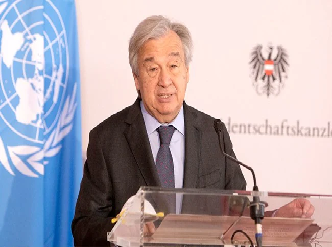There needs to be a major shift in global governance to better tackle such current and looming challenges as the climate crisis and rising security threats, according to a new UN report.
Launched by the UN’s High-Level Advisory Board on Effective Multilateralism, A Breakthrough for People and Planet: Effective and Inclusive Global Governance for Today and the Future, outlines an ambitious plan to overhaul the global architecture.
Co-chaired by former President of Liberia, Ellen Johnson Sirleaf, and former Prime Minister of Sweden, Stefan Lofven, the Advisory Board was appointed by the UN Secretary-General Antonio Guterres in 2022, tasked with advising Member States on issues of key global concern where better governance could make a difference.
“Future generations will judge us by the decisions we take today,” Mr Lofven said.
“Multilateralism can work, but it must work better and faster,” he added. “Our people-centred recommendations aim to strengthen international cooperation and support an accelerated implementation of the Sustainable Development Goals (SDGs) and the Paris Agreement (on climate change).”
Johnson Sirleaf agreed, “I am confident that the report provides the framework that the UN, Member States, and others need to strengthen international cooperation for current and future generations,” she said, noting that the report stemmed from a year-long engagement with hundreds of networks, organizations, and civil society groups committed to addressing global challenges.
“The solutions they shared will help current and future generations to avoid the catastrophic implications of our current trajectory and secure a more sustainable, just and peaceful world for people and planet,” she said.
The recommendations include strengthening the global architecture for peace, security, and finance, delivering just transitions for climate and digitalization, and ensuring more equity and fairness in global decision-making.
The report also argues that gender equality needs to be at the heart of a reinvigorated multilateral system along with recommendations to ensure that system becomes more networked, more inclusive, and more effective.
Six transformational shifts frame the report: rebuilding trust in multilateralism through inclusion and accountability; regaining balance with nature and providing clean energy for all; ensuring abundant and sustainable finance that truly delivers; supporting a just digital transition that unlocks the value of data and protects against digital harms; empowering effective, equitable collective security arrangements; and managing current and emerging transnational risks.
“Today’s geo-political tensions must not stand in the way of addressing multiple and growing challenges to our collective security,” Mr Lofven said.
“We need to understand and prepare better for emerging and future risks; we need to build more transparency and trust in international relations,” he added, highlighting the report’s call for a renewed effort to reform the UN Security Council, strengthening the UN peacebuilding architecture, and broadening of relations between the UN and regional organisations.
The report will inform ongoing deliberations leading up to the 2024 Summit of the Future, where Member States will consider ways to lay the foundations for more effective global cooperation.



